Elder Care Product Market
Elder Care Product Market Size and Share Forecast Outlook 2025 to 2035
Elder care product market is projected to grow from USD 21,430.8 million in 2025 to USD 31,419.1 million by 2035, at a CAGR of 3.9%. Mobility Aids will dominate with a 37.5% market share, while pharmacies & retail stores will lead the distribution channel segment with a 45.7% share.
Elder Care Product Market Forecast and Outlook 2025 to 2035
The global elder care product market is forecasted to grow from USD 21,430.8 million in 2025 to approximately USD 31,250.7 million by 2035, recording an absolute increase of USD 9,819.9 million over the forecast period. This translates into a total growth of 45.8%, with the market forecast to expand at a CAGR of 3.9% between 2025 and 2035.
The overall market size is expected to grow by nearly 1.5 times during the same period, supported by increasing demand for specialized elder care solutions, rising adoption in home healthcare and institutional settings, and increasing focus on aging population support for specialized elder care applications across the global healthcare and home care sectors.
Quick Stats for Elder Care Product Market
- Elder Care Product Market Value (2025): USD 21,430.8 million
- Elder Care Product Market Forecast Value (2035): USD 31,250.7 million
- Elder Care Product Market Forecast CAGR: 3.9%
- Leading Product Type in Elder Care Product Market: Mobility Aids (37.5%)
- Key Growth Regions in Elder Care Product Market: Asia Pacific, North America, and Europe
- Key Players in Elder Care Product Market: Invacare, Drive DeVilbiss Healthcare, Etac AB, Pride Mobility, Medline Industries, ArjoHuntleigh, Cardinal Health, Handicare
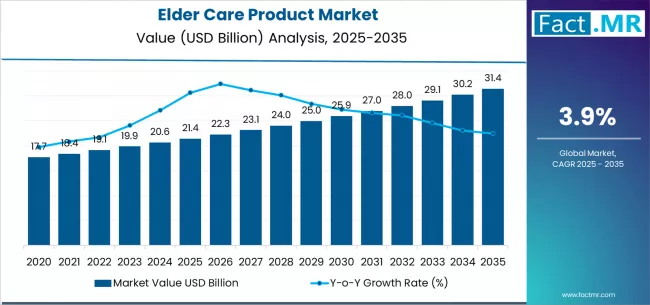
Between 2025 and 2030, the market is projected to expand from USD 21,430.8 million to USD 25,785.4 million, resulting in a value increase of USD 4,354.6 million, which represents 44.3% of the total forecast growth for the decade. This phase of development will be shaped by rising demand for healthcare solutions, increasing applications in elder care optimization, and growing penetration in emerging healthcare markets. Healthcare manufacturers are expanding their production capabilities to address the growing demand for specialized care systems in various healthcare applications and elder care processes.
Elder Care Product Market Key Takeaways
| Metric | Value |
|---|---|
| Estimated Value in (2025E) | USD 21,430.8 million |
| Forecast Value in (2035F) | USD 31,250.7 million |
| Forecast CAGR (2025 to 2035) | 3.9% |
From 2030 to 2035, the market is forecast to grow from USD 25,785.4 million to USD 31,250.7 million, adding another USD 5,465.3 million, which constitutes 55.7% of the overall ten-year expansion. This period is expected to be characterized by the expansion of specialized healthcare facilities, the integration of advanced elder care technologies, and the development of customized elder care systems for specific healthcare applications. The growing adoption of healthcare standards and elder care requirements will drive demand for ultra-high efficiency elder care product systems with enhanced performance specifications and consistent care characteristics.
Between 2020 and 2025, the market experienced steady expansion, driven by increasing recognition of healthcare technologies' importance in care operations and growing acceptance of specialized elder care solutions in complex healthcare processes. The market developed as healthcare providers recognized the need for high-efficiency care systems to address stringent quality requirements and improve overall elder care outcomes. Research and development activities have begun to emphasize the importance of advanced elder care technologies in achieving better efficiency and quality in healthcare processes.
Why is the Elder Care Product Market Growing?
Market expansion is being supported by the increasing demand for healthcare solutions and the corresponding need for high-efficiency care systems in elder care applications across global healthcare and home care operations. Modern healthcare providers are increasingly focused on specialized elder care technologies that can improve care efficiency, reduce healthcare costs, and enhance care quality while meeting stringent performance requirements. The proven efficacy of elder care product services in various healthcare applications makes them an essential component of comprehensive healthcare strategies and care production.
The growing focus on healthcare industry transformation and advanced elder care optimization is driving demand for ultra-efficient elder care product systems that meet stringent performance specifications and quality requirements for healthcare applications. Healthcare manufacturers' preference for reliable, high-performance care systems that can ensure consistent elder care outcomes is creating opportunities for innovative elder care technologies and customized healthcare solutions. The rising influence of quality guidelines and healthcare protocols is also contributing to increased adoption of premium-grade elder care product systems across different healthcare applications and care systems requiring specialized elder care technology.
Opportunity Pathways - Elder Care Product Market
The elder care product market represents a specialized growth opportunity, expanding from USD 21,430.8 million in 2025 to USD 31,250.7 million by 2035 at a 3.9% CAGR. As healthcare providers prioritize care efficiency, quality compliance, and elder care performance in complex healthcare processes, elder care product systems have evolved from a niche healthcare technology to an essential component enabling care, development optimization, and multi-stage healthcare production across healthcare operations and specialized elder care applications.
The convergence of healthcare expansion, increasing elder care adoption, specialized healthcare organization growth, and care requirements creates momentum in demand. High-efficiency formulations offering superior elder care performance, cost-effective mobility aid systems balancing performance with economics, and specialized personal care variants for critical applications will capture market premiums, while geographic expansion into high-growth Asian healthcare markets and emerging market penetration will drive volume leadership. Quality focus on elder care performance and healthcare reliability provides structural support.
- Pathway A - Mobility Aids Dominance: Leading with 37.5% market share, mobility aids drive primary demand through complex healthcare workflows requiring specialized care systems for elder care production. Advanced formulations enabling improved healthcare efficiency, reduced care risks, and enhanced elder care quality command premium pricing from healthcare providers requiring stringent performance specifications and quality compliance. Expected revenue pool: USD 8,036.5-11,718.8 million.
- Pathway B - Personal Care Products Market Leadership: Dominating with 33.6% market share through an optimal balance of performance and cost-effectiveness, personal care products serve most healthcare applications while meeting elder care requirements. This specification addresses both performance standards and economic considerations, making it the preferred choice for healthcare development and elder care operations seeking reliable performance. Opportunity: USD 7,200.7-10,500.2 million.
- Pathway C - Asian Market Acceleration: India (5.8% CAGR) and China (5.2% CAGR) lead global growth through healthcare infrastructure expansion, elder care capability development, and domestic elder care product demand. Strategic partnerships with local manufacturers, quality compliance expertise, and supply chain localization enable the expansion of healthcare technology in major elder care hubs. Geographic expansion upside: USD 5,500.0-7,800.0 million.
- Pathway D - Homecare Premium Segment: Homecare serves specialized applications requiring exceptional performance specifications for critical healthcare processes. Homecare formulations supporting advanced care requirements, complex elder care applications, and performance-sensitive processes command significant premiums from advanced healthcare companies and specialized elder care organizations. Revenue potential: USD 11,274.6-16,436.9 million.
- Pathway E - Advanced Healthcare & Technology Systems: Companies investing in sophisticated elder care technologies, healthcare systems, and automated care processes gain competitive advantages through consistent system performance and elder care quality reliability. Advanced healthcare capabilities enabling customized specifications and rapid scale-up capture premium healthcare partnerships. Technology premium: USD 4,200.0-6,100.0 million.
- Pathway F - Supply Chain Optimization & Reliability: Specialized distribution networks, strategic inventory management, and reliable supply chain systems create competitive differentiation in healthcare markets requiring consistent elder care product service availability. Companies offering guaranteed supply security, technical support, and quality documentation gain preferred supplier status with compliance-focused healthcare providers. Supply chain value: USD 3,800.0-5,200.0 million.
- Pathway G - Emerging Applications & Market Development: Beyond traditional mobility aids, elder care product in medical furniture applications, specialized care systems, and advanced healthcare solutions represent growth opportunities. Companies developing new applications, supporting R&D initiatives, and expanding into adjacent healthcare markets capture incremental demand while diversifying revenue streams. Emerging opportunity: USD 3,200.0-4,500.0 million.
Segmental Analysis
The market is segmented by product type, distribution channel, end user, and region. By product type, the market is divided into Mobility Aids, Personal Care Products, and Medical Furniture & Beds. Based on distribution channel, the market is categorized into Pharmacies & Retail Stores, Online Stores, and Others. By end user, the market is divided into Homecare, Hospitals, and Others. Regionally, the market is divided into Asia Pacific, North America, Europe, Latin America, Middle East & Africa.
By Product Type, Mobility Aids Segment Accounts for 37.5% Market Share
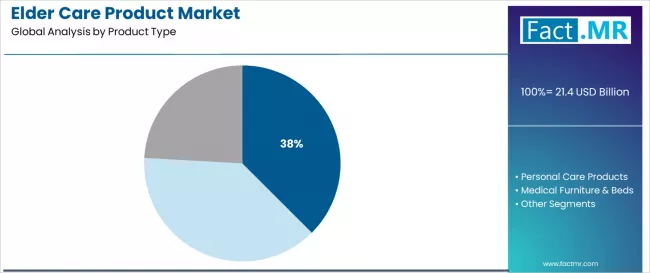
The mobility aids segment is projected to account for 37.5% of the elder care product market in 2025, reaffirming its position as the category's dominant product type. Healthcare manufacturers increasingly recognize the optimal balance of performance and cost-effectiveness offered by mobility aids for most healthcare applications, particularly in elder care and healthcare development processes. This product type addresses both performance requirements and economic considerations while providing reliable care across diverse healthcare applications.
This product type forms the foundation of most healthcare protocols for elder care applications, as it represents the most widely accepted and commercially viable level of elder care technology in the industry. Performance control standards and extensive healthcare testing continue to strengthen confidence in mobility aid formulations among healthcare and elder care providers. With increasing recognition of the cost-performance optimization requirements in healthcare, Mobility Aids systems align with both operational efficiency and elder care quality goals, making them the central growth driver of comprehensive healthcare strategies.
By Distribution Channel, Pharmacies & Retail Stores Segment Accounts for 45.7% Market Share
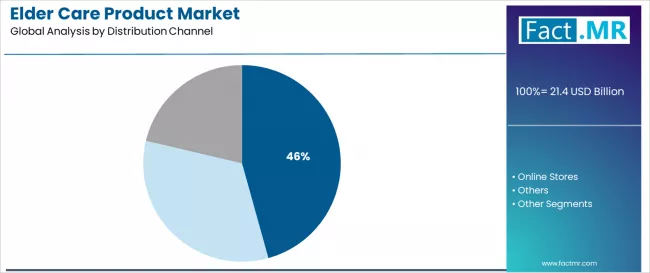
Pharmacies & retail stores are projected to represent 45.7% of elder care product demand in 2025, underscoring their role as the primary distribution channel segment driving market adoption and growth. Healthcare manufacturers recognize that pharmacy and retail requirements, including complex distribution processes, specialized elder care needs, and multi-stage healthcare systems, often require specialized distribution services that standard healthcare technologies cannot adequately provide. Elder care product offers enhanced distribution efficiency and quality compliance in pharmacy and retail applications.
The segment is supported by the growing nature of pharmacy and retail adoption, requiring sophisticated distribution systems, and the increasing recognition that specialized elder care technologies can improve healthcare performance and distribution outcomes. Healthcare providers are increasingly adopting evidence-based healthcare guidelines that recommend specific elder care services for optimal distribution outcomes. As understanding of healthcare complexity advances and quality requirements become more stringent, elder care product will continue to play a crucial role in comprehensive healthcare strategies within the pharmacies & retail stores market.
By End User, Homecare Segment Accounts for 52.6% Market Share
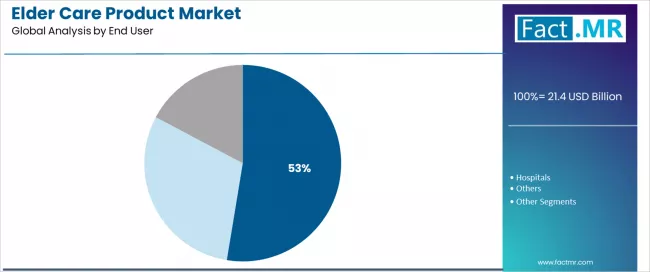
Homecare is projected to represent 52.6% of elder care product demand in 2025, underscoring its role as the primary end user segment driving market adoption and growth. Healthcare manufacturers recognize that homecare requirements, including complex care processes, specialized elder care needs, and multi-stage healthcare systems, often require specialized elder care services that standard healthcare technologies cannot adequately provide. Elder care product offers enhanced care efficiency and quality compliance in homecare applications.
The segment is supported by the growing nature of homecare adoption, requiring sophisticated care systems, and the increasing recognition that specialized elder care technologies can improve healthcare performance and care outcomes. The healthcare providers are increasingly adopting evidence-based healthcare guidelines that recommend specific elder care services for optimal care outcomes. As understanding of healthcare complexity advances and quality requirements become more stringent, elder care product will continue to play a crucial role in comprehensive healthcare strategies within the homecare market.
What are the Drivers, Restraints, and Key Trends of the Elder Care Product Market?
The elder care product market is advancing steadily due to increasing recognition of healthcare technologies' importance and growing demand for high-efficiency care systems across the healthcare and home care sectors. However, the market faces challenges, including complex integration processes, potential for compatibility variations during implementation and maintenance, and concerns about supply chain consistency for specialized healthcare equipment. Innovation in elder care technologies and customized healthcare protocols continues to influence product development and market expansion patterns.
Expansion of Specialized Healthcare and Elder Care Technologies
The growing adoption of advanced healthcare facilities is enabling the development of more sophisticated elder care product production and performance control systems that can meet stringent quality requirements. Specialized healthcare facilities offer comprehensive elder care services, including advanced healthcare development and care processes that are particularly important for achieving high-efficiency requirements in healthcare applications. Advanced elder care channels provide access to premium services that can optimize healthcare performance and reduce development costs while maintaining cost-effectiveness for large-scale healthcare operations.
Integration of Digital Healthcare Systems and Care Management Systems
Modern healthcare companies are incorporating digital technologies such as real-time performance monitoring, automated care systems, and supply chain integration to enhance elder care product distribution and care processes. These technologies improve service performance, enable continuous healthcare monitoring, and provide better coordination between manufacturers and customers throughout the supply chain. Advanced digital platforms also enable customized performance specifications and early identification of potential service deviations or supply disruptions, supporting reliable healthcare production.
Analysis of the Elder Care Product Market by Key Country
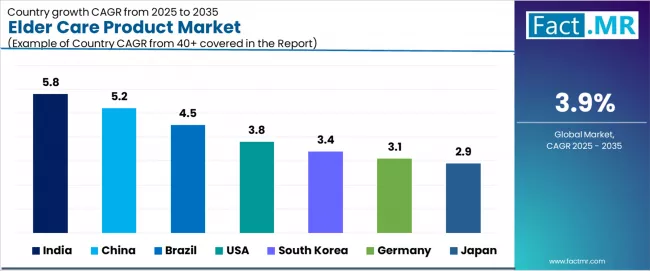
| Country | CAGR (2025-2035) |
|---|---|
| India | 5.8% |
| China | 5.2% |
| Brazil | 4.5% |
| USA | 3.8% |
| South Korea | 3.4% |
| Germany | 3.1% |
| Japan | 2.9% |
The market is experiencing varied growth globally, with India leading at a 5.8% CAGR through 2035, driven by the expansion of healthcare infrastructure development, increasing elder care capabilities, and growing domestic demand for high-efficiency care systems. China follows at 5.2%, supported by healthcare expansion, growing recognition of specialized elder care technology importance, and expanding care capacity. Brazil shows growth at 4.5%, emphasizing advanced healthcare technologies and precision elder care applications. USA records 3.8% growth, with a focus on developing the healthcare technology and elder care industries. South Korea shows 3.4% growth, representing a mature market with established care patterns and quality frameworks. Germany exhibits 3.1% growth, supported by advanced care frameworks and comprehensive healthcare guidelines. Japan demonstrates 2.9% growth, focusing healthcare infrastructure expansion and systematic elder care approaches.
India Demonstrates Growing Market Potential with Healthcare Infrastructure Development
India is projected to exhibit robust growth with a CAGR of 5.8% through 2035, driven by ongoing healthcare expansion and increasing recognition of high-efficiency care systems as essential healthcare components for complex elder care processes. The country's expanding healthcare infrastructure and growing availability of specialized elder care capabilities are creating significant opportunities for elder care product adoption across both domestic and export-oriented healthcare facilities. Major international and domestic healthcare companies are establishing comprehensive production and distribution networks to serve the growing population of healthcare providers and elder care manufacturers requiring high-performance care systems across homecare and healthcare applications throughout India's major healthcare hubs.
The Indian government's strategic focus on healthcare modernization and elder care advancement is driving substantial investments in specialized elder care capabilities. This policy support, combined with the country's large domestic healthcare market and expanding elder care requirements, creates a favorable environment for the elder care product market development. Indian manufacturers are increasingly focusing on high-value healthcare technologies to improve elder care capabilities, with elder care product representing a key component in this healthcare transformation.
- Government initiatives supporting healthcare development and elder care modernization are driving demand for high-efficiency care systems throughout major healthcare and elder care centers, including Delhi, Mumbai, and Bangalore regions.
- Care capacity expansion and elder care system development are supporting appropriate utilization of elder care product among healthcare providers and elder care manufacturers nationwide, with particular growth in homecare operations and healthcare services.
China Demonstrates Exceptional Market Potential with Healthcare Growth
China is expanding at a CAGR of 5.2%, supported by increasing healthcare accessibility, growing elder care awareness, and developing technology market presence across the country's major healthcare clusters. The country's large healthcare sector and increasing recognition of specialized elder care systems are driving demand for effective high-efficiency care solutions in both healthcare development and elder care applications. International healthcare companies and domestic manufacturers are establishing comprehensive distribution channels to serve the growing demand for quality care systems while supporting the country's position as an emerging healthcare technology market.
China's healthcare sector continues to benefit from favorable elder care policies, expanding care capabilities, and cost-competitive healthcare infrastructure development. The country's focus on becoming a global healthcare technology hub is driving investments in specialized elder care technology and care infrastructure. This development is particularly important for elder care product applications, as healthcare providers seek reliable domestic sources for critical elder care technologies to reduce import dependency and improve supply chain security.
- Rising awareness about advanced elder care options and improving care capabilities are creating opportunities for specialized care systems across healthcare and elder care settings in major hubs like Beijing, Shanghai, and Shenzhen.
- Growing care infrastructure development and technology adoption are supporting increased access to high-efficiency elder care product among companies requiring comprehensive elder care capabilities, particularly in healthcare and elder care organizations.
Brazil Maintains Technology Leadership
Brazil's advanced healthcare technology market demonstrates sophisticated elder care deployment with documented care effectiveness in healthcare facility departments and elder care centers through integration with existing healthcare systems and elder care infrastructure. The country leverages care expertise in healthcare technology and elder care systems integration to maintain a 4.5% CAGR through 2035. Healthcare centers, including São Paulo, Rio de Janeiro, and Brasília, showcase premium installations where elder care product systems integrate with comprehensive healthcare information systems and elder care platforms to optimize care accuracy and operational workflow effectiveness.
Brazilian healthcare technology providers prioritize system reliability and quality compliance in elder care development, creating demand for premium systems with advanced features, including quality validation and integration with Brazilian healthcare standards. The market benefits from established healthcare industry infrastructure and a willingness to invest in advanced elder care technologies that provide long-term operational benefits and compliance with healthcare regulations.
USA Shows Strong Regional Leadership
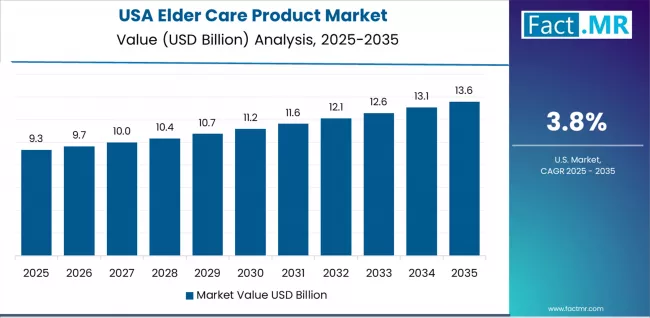
The USA's market expansion benefits from diverse healthcare demand, including elder care modernization in major cities, care development programs, and government healthcare programs that increasingly incorporate elder care product solutions for care enhancement applications. The country maintains a 3.8% CAGR through 2035, driven by rising healthcare awareness and increasing adoption of elder care benefits, including superior care capabilities and reduced development complexity.
Market dynamics focus on cost-effective elder care product solutions that balance advanced care features with affordability considerations important to American healthcare operators. Growing healthcare infrastructure creates demand for modern elder care systems in new care facilities and healthcare equipment modernization projects.
Strategic Market Considerations:
- Healthcare and elder care segments leading growth with focus on care enhancement and operational efficiency applications
- Regional healthcare requirements are driving a diverse product portfolio from basic elder care product systems to advanced care platforms
- Import dependency challenges offset by potential local development partnerships with international elder care manufacturers
- Government healthcare initiatives beginning to influence procurement standards and elder care requirements
South Korea Demonstrates Healthcare Innovation
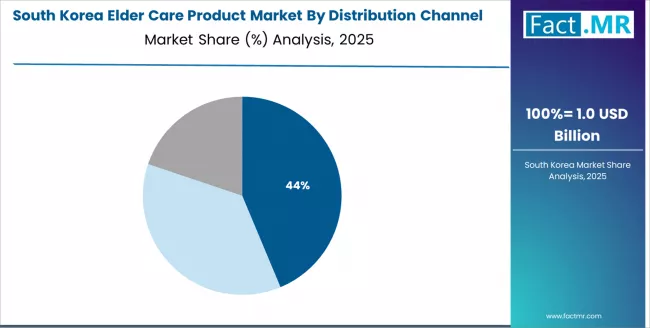
The South Korea market emphasizes advanced elder care product features, including precision care processing and integration with comprehensive healthcare information systems that manage elder care scheduling, quality monitoring, and operational support applications through unified healthcare platforms. The country is projected to show a 3.4% CAGR through 2035, driven by healthcare modernization under elder care equipment upgrades and government support for care systems. South Korean healthcare operators prioritize operational effectiveness with elder care product, delivering consistent care assistance through advanced elder care algorithms and operational compliance capabilities.
Technology deployment channels include major healthcare technology contractors, specialized elder care suppliers, and healthcare authority programs that support professional installation for complex elder care applications. Healthcare platform integration capabilities with established care systems expand market appeal across diverse elder care requirements seeking operational efficiency and healthcare compliance benefits.
Performance Metrics:
- Healthcare systems in Seoul, Busan, and Incheon are leading elder care product adoption for specialized elder care applications
- Healthcare technology contractor channels maintaining 68% market share for complex care integration applications
- Healthcare authority programs support 32% of elder care product acquisitions across elder care and healthcare facility segments
- Healthcare platform compatibility with major care information systems, driving procurement selection criteria
Germany Prioritizes Precision and Integration Excellence
Germany demonstrates steady market development with a 3.1% CAGR through 2035, distinguished by healthcare operators' preference for high-quality elder care product systems that integrate seamlessly with existing healthcare equipment and provide reliable long-term operation in specialized elder care applications. The market prioritizes advanced features, including precision care algorithms, quality validation, and integration with comprehensive healthcare platforms that reflect German healthcare expectations for technological sophistication and operational excellence.
German healthcare technology providers focus on system reliability and precision in elder care product development, creating demand for premium systems with advanced features including automated quality monitoring and comprehensive elder care support. The market benefits from established healthcare research infrastructure and investment in elder care technology that provides long-term healthcare benefits.
Strategic Market Indicators:
- Premium focus on precision systems with advanced care algorithms and high-reliability capabilities
- Integration requirements with existing healthcare information systems and elder care management platforms
- Focus on elder care product reliability and long-term performance in healthcare applications
Japan Demonstrates Mature Market Development
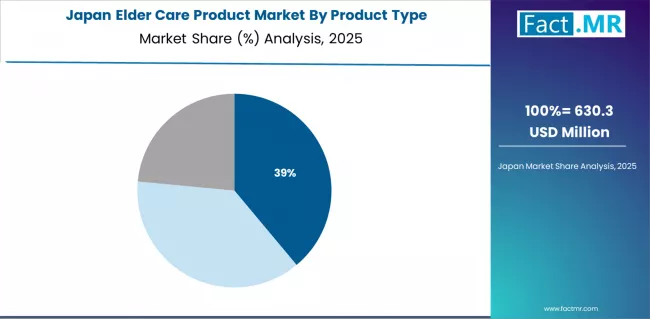
Japan exhibits steady market development with a 2.9% CAGR through 2035, characterized by healthcare operators' preference for high-quality elder care product systems that integrate seamlessly with existing healthcare equipment and provide reliable long-term operation in specialized elder care applications. The market prioritizes advanced features, including precision care algorithms, quality validation, and integration with comprehensive healthcare platforms that reflect Japanese healthcare expectations for technological sophistication and operational excellence.
Japanese healthcare technology providers focus on system reliability and precision in elder care product development, creating demand for premium systems with advanced features including automated quality monitoring and comprehensive elder care support. The market benefits from established healthcare research infrastructure and investment in elder care technology that provides long-term healthcare benefits. Major healthcare centers including Tokyo, Osaka, and Yokohama showcase premium installations where elder care product systems integrate with comprehensive healthcare information systems.
Performance Characteristics:
- Advanced care systems with sophisticated elder care algorithms and high-reliability capabilities
- Strong integration requirements with existing healthcare information systems and elder care management platforms
- Focus on long-term performance reliability and consistent quality in healthcare applications
- Focus on precision engineering and technological innovation in elder care solutions
Europe Market Split by Country
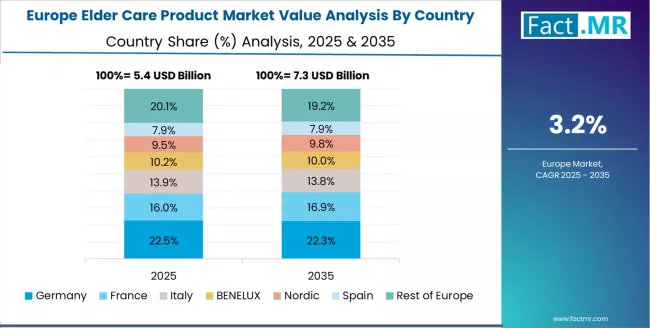
The elder care product market in Europe is projected to grow from USD 4,500.0 million in 2025 to USD 6,562.5 million by 2035, registering a CAGR of 3.9% over the forecast period. Germany is expected to maintain its leadership position with a 22.8% market share in 2025, rising to 23.6% by 2035, supported by its advanced healthcare infrastructure, precision elder care capabilities, and strong healthcare presence throughout major elder care regions.
The United Kingdom follows with a 16.0% share in 2025, projected to reach 16.6% by 2035, driven by advanced care protocols, healthcare innovation integration, and expanding specialty elder care networks serving both domestic and international markets. France holds a 15.6% share in 2025, expected to increase to 16.1% by 2035, supported by healthcare infrastructure expansion and growing adoption of high-efficiency elder care systems. Italy commands a 12.7% share in 2025, projected to reach 13.2% by 2035, while Spain accounts for 9.9% in 2025, expected to reach 10.3% by 2035. The Rest of Europe region, including Nordic countries, Eastern Europe, and smaller Western European markets, is anticipated to hold 23.0% in 2025, declining slightly to 20.2% by 2035, attributed to market consolidation toward larger core markets with established healthcare and elder care capabilities.
Competitive Landscape of the Elder Care Product Market
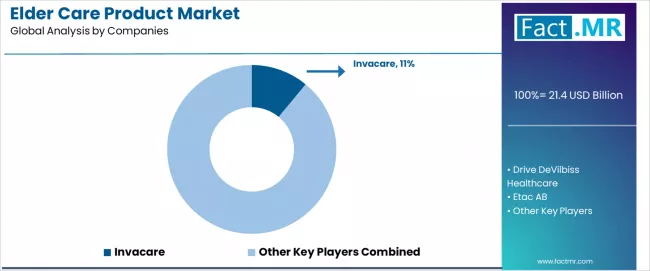
The market is characterized by competition among established healthcare manufacturers, specialty elder care companies, and healthcare suppliers focused on delivering high-efficiency, consistent, and reliable care systems. Companies are investing in elder care technology advancement, performance control enhancement, strategic partnerships, and customer technical support to deliver effective, efficient, and reliable elder care product solutions that meet stringent healthcare and elder care requirements. Care optimization, performance validation protocols, and supply chain strategies are central to strengthening product portfolios and market presence.
Invacare leads the market with comprehensive high-efficiency care system offerings with a focus on performance consistency and care reliability for healthcare applications. Drive DeVilbiss Healthcare provides specialized elder care product systems with focus on elder care applications and comprehensive technical support services. Etac AB focuses on advanced elder care technologies and customized healthcare solutions for care systems serving global markets. Pride Mobility delivers established healthcare systems with strong performance control systems and customer service capabilities.
Medline Industries operates with a focus on bringing innovative elder care technologies to specialized healthcare applications and emerging markets. ArjoHuntleigh provides comprehensive care system portfolios, including elder care product, across multiple healthcare applications and elder care processes. Cardinal Health specializes in customized elder care solutions and performance management systems for healthcare systems with focus on quality compliance. Handicare provides reliable supply chain solutions and technical expertise to enhance market accessibility and customer access to essential elder care systems.
Key Players in the Elder Care Product Market
- Invacare
- Drive DeVilbiss Healthcare
- Etac AB
- Pride Mobility
- Medline Industries
- ArjoHuntleigh
- Cardinal Health
- Handicare
- Hill-Rom
- Sunrise Medical
- Compass Health Brands
- Philips Healthcare
- Stannah Stairlifts
- Acorn Mobility
- Hero Health
Scope of the Report
| Items | Values |
|---|---|
| Quantitative Units (2025) | USD 21,430.8 million |
| Product Type | Mobility Aids, Personal Care Products, Medical Furniture & Beds |
| Distribution Channel | Pharmacies & Retail Stores, Online Stores, Others |
| End User | Homecare, Hospitals, Others |
| Regions Covered | Asia Pacific, North America, Europe, Latin America, Middle East & Africa |
| Countries Covered | India, China, Brazil, USA, South Korea, Germany, Japan and 40+ countries |
| Key Companies Profiled | Invacare, Drive DeVilbiss Healthcare, Etac AB, Pride Mobility, Medline Industries, ArjoHuntleigh, Cardinal Health, and Handicare |
| Additional Attributes | Dollar sales by product type and distribution channel, regional demand trends, competitive landscape, manufacturer preferences for specific elder care systems, integration with specialty healthcare supply chains, innovations in elder care technologies, performance monitoring, and elder care optimization |
Elder Care Product Market by Segments
-
Product Type :
- Mobility Aids
- Personal Care Products
- Medical Furniture & Beds
-
Distribution Channel :
- Pharmacies & Retail Stores
- Online Stores
- Others
-
End User :
- Homecare
- Hospitals
- Others
-
Region:
-
Asia Pacific
- China
- India
- Japan
- South Korea
- ASEAN
- Australia & New Zealand
- Rest of Asia Pacific
-
North America
- United States
- Canada
- Mexico
-
Europe
- Germany
- United Kingdom
- France
- Italy
- Spain
- Nordic
- BENELUX
- Rest of Europe
-
Latin America
- Brazil
- Argentina
- Chile
- Rest of Latin America
-
Middle East & Africa
- Kingdom of Saudi Arabia
- Other GCC Countries
- Turkey
- South Africa
- Other African Countries
- Rest of Middle East & Africa
-
Table of Content
- Executive Summary
- Global Market Outlook
- Demand to side Trends
- Supply to side Trends
- Technology Roadmap Analysis
- Analysis and Recommendations
- Market Overview
- Market Coverage / Taxonomy
- Market Definition / Scope / Limitations
- Market Background
- Market Dynamics
- Drivers
- Restraints
- Opportunity
- Trends
- Scenario Forecast
- Demand in Optimistic Scenario
- Demand in Likely Scenario
- Demand in Conservative Scenario
- Opportunity Map Analysis
- Product Life Cycle Analysis
- Supply Chain Analysis
- Investment Feasibility Matrix
- Value Chain Analysis
- PESTLE and Porter’s Analysis
- Regulatory Landscape
- Regional Parent Market Outlook
- Production and Consumption Statistics
- Import and Export Statistics
- Market Dynamics
- Global Market Analysis 2020 to 2024 and Forecast, 2025 to 2035
- Historical Market Size Value (USD Million) Analysis, 2020 to 2024
- Current and Future Market Size Value (USD Million) Projections, 2025 to 2035
- Y to o to Y Growth Trend Analysis
- Absolute $ Opportunity Analysis
- Global Market Pricing Analysis 2020 to 2024 and Forecast 2025 to 2035
- Global Market Analysis 2020 to 2024 and Forecast 2025 to 2035, By Product Type
- Introduction / Key Findings
- Historical Market Size Value (USD Million) Analysis By Product Type , 2020 to 2024
- Current and Future Market Size Value (USD Million) Analysis and Forecast By Product Type , 2025 to 2035
- Mobility Aids
- Personal Care Products
- Medical Furniture & Beds
- Y to o to Y Growth Trend Analysis By Product Type , 2020 to 2024
- Absolute $ Opportunity Analysis By Product Type , 2025 to 2035
- Global Market Analysis 2020 to 2024 and Forecast 2025 to 2035, By Distribution Channel
- Introduction / Key Findings
- Historical Market Size Value (USD Million) Analysis By Distribution Channel, 2020 to 2024
- Current and Future Market Size Value (USD Million) Analysis and Forecast By Distribution Channel, 2025 to 2035
- Pharmacies & Retail Stores
- Online Stores
- Others
- Y to o to Y Growth Trend Analysis By Distribution Channel, 2020 to 2024
- Absolute $ Opportunity Analysis By Distribution Channel, 2025 to 2035
- Global Market Analysis 2020 to 2024 and Forecast 2025 to 2035, By End User
- Introduction / Key Findings
- Historical Market Size Value (USD Million) Analysis By End User, 2020 to 2024
- Current and Future Market Size Value (USD Million) Analysis and Forecast By End User, 2025 to 2035
- Homecare
- Hospitals
- Others
- Y to o to Y Growth Trend Analysis By End User, 2020 to 2024
- Absolute $ Opportunity Analysis By End User, 2025 to 2035
- Global Market Analysis 2020 to 2024 and Forecast 2025 to 2035, By Region
- Introduction
- Historical Market Size Value (USD Million) Analysis By Region, 2020 to 2024
- Current Market Size Value (USD Million) Analysis and Forecast By Region, 2025 to 2035
- North America
- Latin America
- Western Europe
- Eastern Europe
- East Asia
- South Asia and Pacific
- Middle East & Africa
- Market Attractiveness Analysis By Region
- North America Market Analysis 2020 to 2024 and Forecast 2025 to 2035, By Country
- Historical Market Size Value (USD Million) Trend Analysis By Market Taxonomy, 2020 to 2024
- Market Size Value (USD Million) Forecast By Market Taxonomy, 2025 to 2035
- By Country
- USA
- Canada
- Mexico
- By Product Type
- By Distribution Channel
- By End User
- By Country
- Market Attractiveness Analysis
- By Country
- By Product Type
- By Distribution Channel
- By End User
- Key Takeaways
- Latin America Market Analysis 2020 to 2024 and Forecast 2025 to 2035, By Country
- Historical Market Size Value (USD Million) Trend Analysis By Market Taxonomy, 2020 to 2024
- Market Size Value (USD Million) Forecast By Market Taxonomy, 2025 to 2035
- By Country
- Brazil
- Chile
- Rest of Latin America
- By Product Type
- By Distribution Channel
- By End User
- By Country
- Market Attractiveness Analysis
- By Country
- By Product Type
- By Distribution Channel
- By End User
- Key Takeaways
- Western Europe Market Analysis 2020 to 2024 and Forecast 2025 to 2035, By Country
- Historical Market Size Value (USD Million) Trend Analysis By Market Taxonomy, 2020 to 2024
- Market Size Value (USD Million) Forecast By Market Taxonomy, 2025 to 2035
- By Country
- Germany
- UK
- Italy
- Spain
- France
- Nordic
- BENELUX
- Rest of Western Europe
- By Product Type
- By Distribution Channel
- By End User
- By Country
- Market Attractiveness Analysis
- By Country
- By Product Type
- By Distribution Channel
- By End User
- Key Takeaways
- Eastern Europe Market Analysis 2020 to 2024 and Forecast 2025 to 2035, By Country
- Historical Market Size Value (USD Million) Trend Analysis By Market Taxonomy, 2020 to 2024
- Market Size Value (USD Million) Forecast By Market Taxonomy, 2025 to 2035
- By Country
- Russia
- Poland
- Hungary
- Balkan & Baltic
- Rest of Eastern Europe
- By Product Type
- By Distribution Channel
- By End User
- By Country
- Market Attractiveness Analysis
- By Country
- By Product Type
- By Distribution Channel
- By End User
- Key Takeaways
- East Asia Market Analysis 2020 to 2024 and Forecast 2025 to 2035, By Country
- Historical Market Size Value (USD Million) Trend Analysis By Market Taxonomy, 2020 to 2024
- Market Size Value (USD Million) Forecast By Market Taxonomy, 2025 to 2035
- By Country
- China
- Japan
- South Korea
- By Product Type
- By Distribution Channel
- By End User
- By Country
- Market Attractiveness Analysis
- By Country
- By Product Type
- By Distribution Channel
- By End User
- Key Takeaways
- South Asia and Pacific Market Analysis 2020 to 2024 and Forecast 2025 to 2035, By Country
- Historical Market Size Value (USD Million) Trend Analysis By Market Taxonomy, 2020 to 2024
- Market Size Value (USD Million) Forecast By Market Taxonomy, 2025 to 2035
- By Country
- India
- ASEAN
- Australia & New Zealand
- Rest of South Asia and Pacific
- By Product Type
- By Distribution Channel
- By End User
- By Country
- Market Attractiveness Analysis
- By Country
- By Product Type
- By Distribution Channel
- By End User
- Key Takeaways
- Middle East & Africa Market Analysis 2020 to 2024 and Forecast 2025 to 2035, By Country
- Historical Market Size Value (USD Million) Trend Analysis By Market Taxonomy, 2020 to 2024
- Market Size Value (USD Million) Forecast By Market Taxonomy, 2025 to 2035
- By Country
- Kingdom of Saudi Arabia
- Other GCC Countries
- Turkiye
- South Africa
- Other African Union
- Rest of Middle East & Africa
- By Product Type
- By Distribution Channel
- By End User
- By Country
- Market Attractiveness Analysis
- By Country
- By Product Type
- By Distribution Channel
- By End User
- Key Takeaways
- Key Countries Market Analysis
- USA
- Pricing Analysis
- Market Share Analysis, 2024
- By Product Type
- By Distribution Channel
- By End User
- Canada
- Pricing Analysis
- Market Share Analysis, 2024
- By Product Type
- By Distribution Channel
- By End User
- Mexico
- Pricing Analysis
- Market Share Analysis, 2024
- By Product Type
- By Distribution Channel
- By End User
- Brazil
- Pricing Analysis
- Market Share Analysis, 2024
- By Product Type
- By Distribution Channel
- By End User
- Chile
- Pricing Analysis
- Market Share Analysis, 2024
- By Product Type
- By Distribution Channel
- By End User
- Germany
- Pricing Analysis
- Market Share Analysis, 2024
- By Product Type
- By Distribution Channel
- By End User
- UK
- Pricing Analysis
- Market Share Analysis, 2024
- By Product Type
- By Distribution Channel
- By End User
- Italy
- Pricing Analysis
- Market Share Analysis, 2024
- By Product Type
- By Distribution Channel
- By End User
- Spain
- Pricing Analysis
- Market Share Analysis, 2024
- By Product Type
- By Distribution Channel
- By End User
- France
- Pricing Analysis
- Market Share Analysis, 2024
- By Product Type
- By Distribution Channel
- By End User
- India
- Pricing Analysis
- Market Share Analysis, 2024
- By Product Type
- By Distribution Channel
- By End User
- ASEAN
- Pricing Analysis
- Market Share Analysis, 2024
- By Product Type
- By Distribution Channel
- By End User
- Australia & New Zealand
- Pricing Analysis
- Market Share Analysis, 2024
- By Product Type
- By Distribution Channel
- By End User
- China
- Pricing Analysis
- Market Share Analysis, 2024
- By Product Type
- By Distribution Channel
- By End User
- Japan
- Pricing Analysis
- Market Share Analysis, 2024
- By Product Type
- By Distribution Channel
- By End User
- South Korea
- Pricing Analysis
- Market Share Analysis, 2024
- By Product Type
- By Distribution Channel
- By End User
- Russia
- Pricing Analysis
- Market Share Analysis, 2024
- By Product Type
- By Distribution Channel
- By End User
- Poland
- Pricing Analysis
- Market Share Analysis, 2024
- By Product Type
- By Distribution Channel
- By End User
- Hungary
- Pricing Analysis
- Market Share Analysis, 2024
- By Product Type
- By Distribution Channel
- By End User
- Kingdom of Saudi Arabia
- Pricing Analysis
- Market Share Analysis, 2024
- By Product Type
- By Distribution Channel
- By End User
- Turkiye
- Pricing Analysis
- Market Share Analysis, 2024
- By Product Type
- By Distribution Channel
- By End User
- South Africa
- Pricing Analysis
- Market Share Analysis, 2024
- By Product Type
- By Distribution Channel
- By End User
- USA
- Market Structure Analysis
- Competition Dashboard
- Competition Benchmarking
- Market Share Analysis of Top Players
- By Regional
- By Product Type
- By Distribution Channel
- By End User
- Competition Analysis
- Competition Deep Dive
- Invacare
- Overview
- Product Portfolio
- Profitability by Market Segments (Product/Age /Sales Channel/Region)
- Sales Footprint
- Strategy Overview
- Marketing Strategy
- Product Strategy
- Channel Strategy
- Drive DeVilbiss Healthcare
- Etac AB
- Pride Mobility
- Medline Industries
- ArjoHuntleigh
- Cardinal Health
- Handicare
- Hill-Rom
- Sunrise Medical
- Compass Health Brands
- Philips Healthcare
- Stannah Stairlifts
- Acorn Mobility
- Hero Health
- Invacare
- Competition Deep Dive
- Assumptions & Acronyms Used
- Research Methodology
List Of Table
- Table 1: Global Market Value (USD Million) Forecast by Region, 2020 to 2035
- Table 2: Global Market Value (USD Million) Forecast by Product Type , 2020 to 2035
- Table 3: Global Market Value (USD Million) Forecast by Distribution Channel, 2020 to 2035
- Table 4: Global Market Value (USD Million) Forecast by End User, 2020 to 2035
- Table 5: North America Market Value (USD Million) Forecast by Country, 2020 to 2035
- Table 6: North America Market Value (USD Million) Forecast by Product Type , 2020 to 2035
- Table 7: North America Market Value (USD Million) Forecast by Distribution Channel, 2020 to 2035
- Table 8: North America Market Value (USD Million) Forecast by End User, 2020 to 2035
- Table 9: Latin America Market Value (USD Million) Forecast by Country, 2020 to 2035
- Table 10: Latin America Market Value (USD Million) Forecast by Product Type , 2020 to 2035
- Table 11: Latin America Market Value (USD Million) Forecast by Distribution Channel, 2020 to 2035
- Table 12: Latin America Market Value (USD Million) Forecast by End User, 2020 to 2035
- Table 13: Western Europe Market Value (USD Million) Forecast by Country, 2020 to 2035
- Table 14: Western Europe Market Value (USD Million) Forecast by Product Type , 2020 to 2035
- Table 15: Western Europe Market Value (USD Million) Forecast by Distribution Channel, 2020 to 2035
- Table 16: Western Europe Market Value (USD Million) Forecast by End User, 2020 to 2035
- Table 17: Eastern Europe Market Value (USD Million) Forecast by Country, 2020 to 2035
- Table 18: Eastern Europe Market Value (USD Million) Forecast by Product Type , 2020 to 2035
- Table 19: Eastern Europe Market Value (USD Million) Forecast by Distribution Channel, 2020 to 2035
- Table 20: Eastern Europe Market Value (USD Million) Forecast by End User, 2020 to 2035
- Table 21: East Asia Market Value (USD Million) Forecast by Country, 2020 to 2035
- Table 22: East Asia Market Value (USD Million) Forecast by Product Type , 2020 to 2035
- Table 23: East Asia Market Value (USD Million) Forecast by Distribution Channel, 2020 to 2035
- Table 24: East Asia Market Value (USD Million) Forecast by End User, 2020 to 2035
- Table 25: South Asia and Pacific Market Value (USD Million) Forecast by Country, 2020 to 2035
- Table 26: South Asia and Pacific Market Value (USD Million) Forecast by Product Type , 2020 to 2035
- Table 27: South Asia and Pacific Market Value (USD Million) Forecast by Distribution Channel, 2020 to 2035
- Table 28: South Asia and Pacific Market Value (USD Million) Forecast by End User, 2020 to 2035
- Table 29: Middle East & Africa Market Value (USD Million) Forecast by Country, 2020 to 2035
- Table 30: Middle East & Africa Market Value (USD Million) Forecast by Product Type , 2020 to 2035
- Table 31: Middle East & Africa Market Value (USD Million) Forecast by Distribution Channel, 2020 to 2035
- Table 32: Middle East & Africa Market Value (USD Million) Forecast by End User, 2020 to 2035
List Of Figures
- Figure 1: Global Market Pricing Analysis
- Figure 2: Global Market Value (USD Million) Forecast 2020-2035
- Figure 3: Global Market Value Share and BPS Analysis by Product Type , 2025 and 2035
- Figure 4: Global Market Y to o to Y Growth Comparison by Product Type , 2025-2035
- Figure 5: Global Market Attractiveness Analysis by Product Type
- Figure 6: Global Market Value Share and BPS Analysis by Distribution Channel, 2025 and 2035
- Figure 7: Global Market Y to o to Y Growth Comparison by Distribution Channel, 2025-2035
- Figure 8: Global Market Attractiveness Analysis by Distribution Channel
- Figure 9: Global Market Value Share and BPS Analysis by End User, 2025 and 2035
- Figure 10: Global Market Y to o to Y Growth Comparison by End User, 2025-2035
- Figure 11: Global Market Attractiveness Analysis by End User
- Figure 12: Global Market Value (USD Million) Share and BPS Analysis by Region, 2025 and 2035
- Figure 13: Global Market Y to o to Y Growth Comparison by Region, 2025-2035
- Figure 14: Global Market Attractiveness Analysis by Region
- Figure 15: North America Market Incremental Dollar Opportunity, 2025-2035
- Figure 16: Latin America Market Incremental Dollar Opportunity, 2025-2035
- Figure 17: Western Europe Market Incremental Dollar Opportunity, 2025-2035
- Figure 18: Eastern Europe Market Incremental Dollar Opportunity, 2025-2035
- Figure 19: East Asia Market Incremental Dollar Opportunity, 2025-2035
- Figure 20: South Asia and Pacific Market Incremental Dollar Opportunity, 2025-2035
- Figure 21: Middle East & Africa Market Incremental Dollar Opportunity, 2025-2035
- Figure 22: North America Market Value Share and BPS Analysis by Country, 2025 and 2035
- Figure 23: North America Market Value Share and BPS Analysis by Product Type , 2025 and 2035
- Figure 24: North America Market Y to o to Y Growth Comparison by Product Type , 2025-2035
- Figure 25: North America Market Attractiveness Analysis by Product Type
- Figure 26: North America Market Value Share and BPS Analysis by Distribution Channel, 2025 and 2035
- Figure 27: North America Market Y to o to Y Growth Comparison by Distribution Channel, 2025-2035
- Figure 28: North America Market Attractiveness Analysis by Distribution Channel
- Figure 29: North America Market Value Share and BPS Analysis by End User, 2025 and 2035
- Figure 30: North America Market Y to o to Y Growth Comparison by End User, 2025-2035
- Figure 31: North America Market Attractiveness Analysis by End User
- Figure 32: Latin America Market Value Share and BPS Analysis by Country, 2025 and 2035
- Figure 33: Latin America Market Value Share and BPS Analysis by Product Type , 2025 and 2035
- Figure 34: Latin America Market Y to o to Y Growth Comparison by Product Type , 2025-2035
- Figure 35: Latin America Market Attractiveness Analysis by Product Type
- Figure 36: Latin America Market Value Share and BPS Analysis by Distribution Channel, 2025 and 2035
- Figure 37: Latin America Market Y to o to Y Growth Comparison by Distribution Channel, 2025-2035
- Figure 38: Latin America Market Attractiveness Analysis by Distribution Channel
- Figure 39: Latin America Market Value Share and BPS Analysis by End User, 2025 and 2035
- Figure 40: Latin America Market Y to o to Y Growth Comparison by End User, 2025-2035
- Figure 41: Latin America Market Attractiveness Analysis by End User
- Figure 42: Western Europe Market Value Share and BPS Analysis by Country, 2025 and 2035
- Figure 43: Western Europe Market Value Share and BPS Analysis by Product Type , 2025 and 2035
- Figure 44: Western Europe Market Y to o to Y Growth Comparison by Product Type , 2025-2035
- Figure 45: Western Europe Market Attractiveness Analysis by Product Type
- Figure 46: Western Europe Market Value Share and BPS Analysis by Distribution Channel, 2025 and 2035
- Figure 47: Western Europe Market Y to o to Y Growth Comparison by Distribution Channel, 2025-2035
- Figure 48: Western Europe Market Attractiveness Analysis by Distribution Channel
- Figure 49: Western Europe Market Value Share and BPS Analysis by End User, 2025 and 2035
- Figure 50: Western Europe Market Y to o to Y Growth Comparison by End User, 2025-2035
- Figure 51: Western Europe Market Attractiveness Analysis by End User
- Figure 52: Eastern Europe Market Value Share and BPS Analysis by Country, 2025 and 2035
- Figure 53: Eastern Europe Market Value Share and BPS Analysis by Product Type , 2025 and 2035
- Figure 54: Eastern Europe Market Y to o to Y Growth Comparison by Product Type , 2025-2035
- Figure 55: Eastern Europe Market Attractiveness Analysis by Product Type
- Figure 56: Eastern Europe Market Value Share and BPS Analysis by Distribution Channel, 2025 and 2035
- Figure 57: Eastern Europe Market Y to o to Y Growth Comparison by Distribution Channel, 2025-2035
- Figure 58: Eastern Europe Market Attractiveness Analysis by Distribution Channel
- Figure 59: Eastern Europe Market Value Share and BPS Analysis by End User, 2025 and 2035
- Figure 60: Eastern Europe Market Y to o to Y Growth Comparison by End User, 2025-2035
- Figure 61: Eastern Europe Market Attractiveness Analysis by End User
- Figure 62: East Asia Market Value Share and BPS Analysis by Country, 2025 and 2035
- Figure 63: East Asia Market Value Share and BPS Analysis by Product Type , 2025 and 2035
- Figure 64: East Asia Market Y to o to Y Growth Comparison by Product Type , 2025-2035
- Figure 65: East Asia Market Attractiveness Analysis by Product Type
- Figure 66: East Asia Market Value Share and BPS Analysis by Distribution Channel, 2025 and 2035
- Figure 67: East Asia Market Y to o to Y Growth Comparison by Distribution Channel, 2025-2035
- Figure 68: East Asia Market Attractiveness Analysis by Distribution Channel
- Figure 69: East Asia Market Value Share and BPS Analysis by End User, 2025 and 2035
- Figure 70: East Asia Market Y to o to Y Growth Comparison by End User, 2025-2035
- Figure 71: East Asia Market Attractiveness Analysis by End User
- Figure 72: South Asia and Pacific Market Value Share and BPS Analysis by Country, 2025 and 2035
- Figure 73: South Asia and Pacific Market Value Share and BPS Analysis by Product Type , 2025 and 2035
- Figure 74: South Asia and Pacific Market Y to o to Y Growth Comparison by Product Type , 2025-2035
- Figure 75: South Asia and Pacific Market Attractiveness Analysis by Product Type
- Figure 76: South Asia and Pacific Market Value Share and BPS Analysis by Distribution Channel, 2025 and 2035
- Figure 77: South Asia and Pacific Market Y to o to Y Growth Comparison by Distribution Channel, 2025-2035
- Figure 78: South Asia and Pacific Market Attractiveness Analysis by Distribution Channel
- Figure 79: South Asia and Pacific Market Value Share and BPS Analysis by End User, 2025 and 2035
- Figure 80: South Asia and Pacific Market Y to o to Y Growth Comparison by End User, 2025-2035
- Figure 81: South Asia and Pacific Market Attractiveness Analysis by End User
- Figure 82: Middle East & Africa Market Value Share and BPS Analysis by Country, 2025 and 2035
- Figure 83: Middle East & Africa Market Value Share and BPS Analysis by Product Type , 2025 and 2035
- Figure 84: Middle East & Africa Market Y to o to Y Growth Comparison by Product Type , 2025-2035
- Figure 85: Middle East & Africa Market Attractiveness Analysis by Product Type
- Figure 86: Middle East & Africa Market Value Share and BPS Analysis by Distribution Channel, 2025 and 2035
- Figure 87: Middle East & Africa Market Y to o to Y Growth Comparison by Distribution Channel, 2025-2035
- Figure 88: Middle East & Africa Market Attractiveness Analysis by Distribution Channel
- Figure 89: Middle East & Africa Market Value Share and BPS Analysis by End User, 2025 and 2035
- Figure 90: Middle East & Africa Market Y to o to Y Growth Comparison by End User, 2025-2035
- Figure 91: Middle East & Africa Market Attractiveness Analysis by End User
- Figure 92: Global Market - Tier Structure Analysis
- Figure 93: Global Market - Company Share Analysis
- FAQs -
How big is the elder care product market in 2025?
The global elder care product market is estimated to be valued at USD 21,430.8 million in 2025.
What will be the size of elder care product market in 2035?
The market size for the elder care product market is projected to reach USD 31,419.1 million by 2035.
How much will be the elder care product market growth between 2025 and 2035?
The elder care product market is expected to grow at a 3.9% CAGR between 2025 and 2035.
What are the key product types in the elder care product market?
The key product types in elder care product market are mobility aids, personal care products and medical furniture & beds.
Which distribution channel segment to contribute significant share in the elder care product market in 2025?
In terms of distribution channel, pharmacies & retail stores segment to command 45.7% share in the elder care product market in 2025.